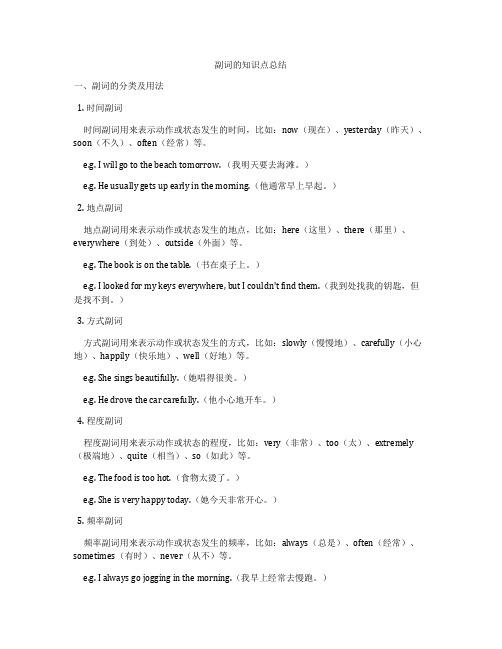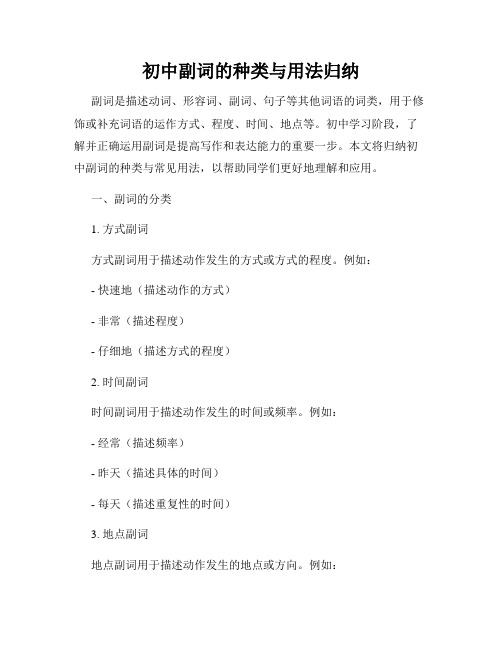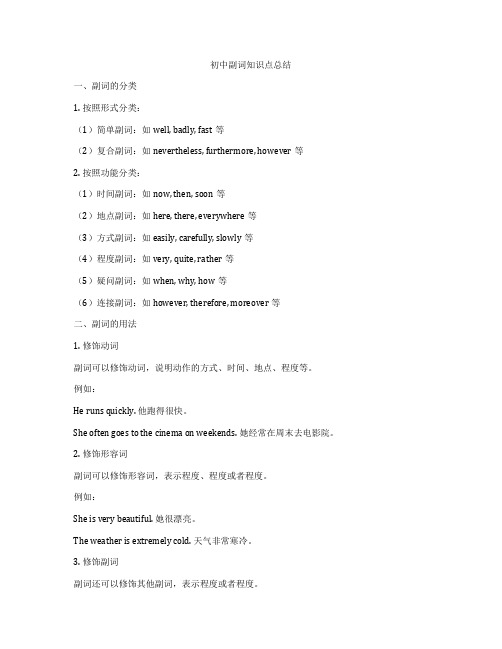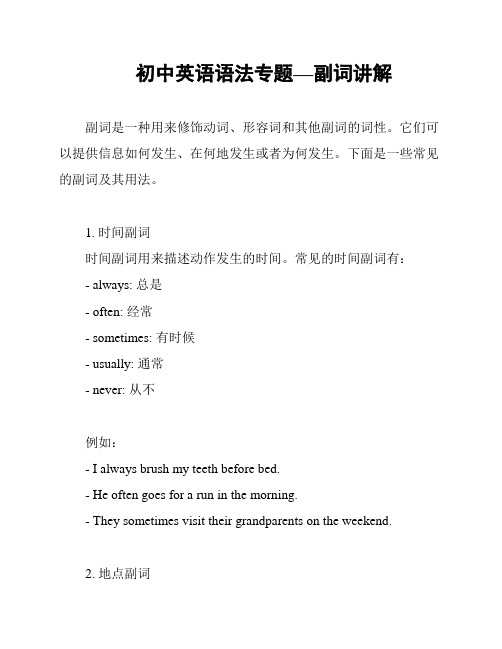初中英语语法知识—副词的分类汇编含解析(2)
初中英语语法知识—副词的知识点

初中英语语法知识—副词的知识点副词(adverb)是一类用于修饰动词、形容词、副词或全句的词语。
副词可以用来表达时间、地点、方式、程度、原因等含义。
1.用法:副词通常放在动词、形容词或副词之后,修饰它们的含义。
例如:- He speaks English fluently.(他英语说得很流利。
)- She sings beautifully.(她唱得很动听。
)- They run extremely fast.(他们跑得非常快。
)2.分类:根据其修饰的内容和含义,副词可以分为以下几类:- 方式副词(adverbs of manner)如well(好地)、quickly(快地)、carefully(小心地)等,用来描述动作的方式。
- 地点副词(adverbs of place)如here(这里)、there(那里)、upstairs(楼上)等,用来表示动作发生的地点。
- 程度副词(adverbs of degree)如very(非常)、quite(相当)、too(太)、extremely(极其)等,用来表示动作或形容词的程度。
- 原因副词(adverbs of reason)如because(因为)、so(所以)、therefore(因此)等,用来表示动作的原因或结果。
3.一些常见的副词:- well(好地)- fast(快速地)- slowly(慢地)- now(现在)- then(然后)- here(在这里)- there(在那里)- very(非常)- quite(相当)- too(太)- often(经常)- always(总是)- never(从不)- because(因为)- so(所以)- therefore(因此)请注意,有些副词形式和形容词相同,例如fast既可以用作形容词,表示快速的,也可以用作副词,表示快速地。
根据上下文,需要确定其具体的词性。
副词的知识点总结

副词的知识点总结一、副词的分类及用法1. 时间副词时间副词用来表示动作或状态发生的时间,比如:now(现在)、yesterday(昨天)、soon(不久)、often(经常)等。
e.g. I will go to the beach tomorrow. (我明天要去海滩。
)e.g. He usually gets up early in the morning.(他通常早上早起。
)2. 地点副词地点副词用来表示动作或状态发生的地点,比如:here(这里)、there(那里)、everywhere(到处)、outside(外面)等。
e.g. The book is on the table.(书在桌子上。
)e.g. I looked for my keys everywhere, but I couldn't find them.(我到处找我的钥匙,但是找不到。
)3. 方式副词方式副词用来表示动作或状态发生的方式,比如:slowly(慢慢地)、carefully(小心地)、happily(快乐地)、well(好地)等。
e.g. She sings beautifully.(她唱得很美。
)e.g. He drove the car carefully.(他小心地开车。
)4. 程度副词程度副词用来表示动作或状态的程度,比如:very(非常)、too(太)、extremely (极端地)、quite(相当)、so(如此)等。
e.g. The food is too hot.(食物太烫了。
)e.g. She is very happy today.(她今天非常开心。
)5. 频率副词频率副词用来表示动作或状态发生的频率,比如:always(总是)、often(经常)、sometimes(有时)、never(从不)等。
e.g. I always go jogging in the morning.(我早上经常去慢跑。
初中副词的种类与用法归纳

初中副词的种类与用法归纳副词是描述动词、形容词、副词、句子等其他词语的词类,用于修饰或补充词语的运作方式、程度、时间、地点等。
初中学习阶段,了解并正确运用副词是提高写作和表达能力的重要一步。
本文将归纳初中副词的种类与常见用法,以帮助同学们更好地理解和应用。
一、副词的分类1. 方式副词方式副词用于描述动作发生的方式或方式的程度。
例如:- 快速地(描述动作的方式)- 非常(描述程度)- 仔细地(描述方式的程度)2. 时间副词时间副词用于描述动作发生的时间或频率。
例如:- 经常(描述频率)- 昨天(描述具体的时间)- 每天(描述重复性的时间)3. 地点副词地点副词用于描述动作发生的地点或方向。
例如:- 在这里(描述具体的地点)- 向前(描述方向)- 远离(描述相对位置)4. 程度副词程度副词用于描述动词、形容词或副词的程度。
例如:- 很(描述程度)- 最(描述比较级)- 非常(描述非常级)5. 位置副词位置副词用于描述动作发生的位置或方向。
例如:- 上面(描述具体的位置)- 向下(描述方向)- 隔壁(描述相对位置)6. 频率副词频率副词用于描述动作或事件发生的次数。
例如:- 有时(描述偶尔)- 经常(描述频繁)- 从不(描述否定频率)二、副词的用法1. 修饰动词副词可以直接修饰动词,表示动词的方式、程度、时间等。
例如:- 他慢慢地走了过来。
- 她高兴地笑了起来。
- 我们昨天去了公园玩。
2. 修饰形容词副词可以修饰形容词,表示对形容词的程度或强调。
例如:- 这本书非常有趣。
- 这个问题太难了。
- 她非常漂亮。
3. 修饰副词副词可以修饰其他副词,用于强调程度或方式的不同。
例如:- 她非常认真地工作。
- 我们一起快乐地唱歌。
- 他们高兴地跳了起来。
4. 修饰句子副词可以修饰整个句子,表示说话人的态度、观点或者句子所描述的动作发生的情况。
例如:- 幸好,我们按时赶到了。
- 不幸的是,他们迟到了。
- 无论如何,我都会努力完成任务。
初中副词知识点总结

初中副词知识点总结一、副词的分类1. 按照形式分类:(1)简单副词:如well, badly, fast等(2)复合副词:如nevertheless, furthermore, however等2. 按照功能分类:(1)时间副词:如now, then, soon等(2)地点副词:如here, there, everywhere等(3)方式副词:如easily, carefully, slowly等(4)程度副词:如very, quite, rather等(5)疑问副词:如when, why, how等(6)连接副词:如however, therefore, moreover等二、副词的用法1. 修饰动词副词可以修饰动词,说明动作的方式、时间、地点、程度等。
例如:He runs quickly. 他跑得很快。
She often goes to the cinema on weekends. 她经常在周末去电影院。
2. 修饰形容词副词可以修饰形容词,表示程度、程度或者程度。
例如:She is very beautiful. 她很漂亮。
The weather is extremely cold. 天气非常寒冷。
3. 修饰副词副词还可以修饰其他副词,表示程度或者程度。
例如:She sings quite beautifully. 她唱得相当漂亮。
I am almost never late. 我几乎从不迟到。
4. 修饰整个句子副词还可以修饰整个句子,表示说话者的态度、观点或行动。
例如:Certainly, I will help you. 当然,我会帮助你。
Unfortunately, it rained on the day of the picnic. 不幸的是,野餐那天下雨了。
5. 位置副词一般放在被修饰的词语之后,若要修饰整个句子则通常放在句首或句尾。
例如:She speaks English fluently. 她英语说得流利。
中考副词知识点总结

中考副词知识点总结一、副词的定义和分类1. 定义:副词是一类修饰动词、形容词、其他副词或全句的词类,它主要用来说明动作的方式、时间、地点、程度、原因等情况。
2. 分类:副词可以根据其修饰的对象和功能进行分类,主要包括以下几种类型:(1)时间副词:用来表示动作发生的时间,如:now, then, yesterday, soon等。
(2)地点副词:用来表示动作发生的地点,如:here, there, everywhere等。
(3)方式副词:用来表示动作进行的方式,如:slowly, carefully, well等。
(4)程度副词:用来表示动作的程度,如:very, quite, extremely等。
(5)频率副词:用来表示动作发生的频率,如:often, rarely, always等。
(6)疑问副词:用来引导疑问句,询问特定情况,如:how, when, where等。
(7)连接副词:用来连接句子的各个部分,如:however, therefore, meanwhile等。
二、副词的用法1. 修饰动词:副词可以用来修饰动词,说明动作进行的方式、时间、地点或程度,如:He runs quickly.(他跑得快。
)She will come here tomorrow.(她明天会来这儿。
)2. 修饰形容词:副词可以用来修饰形容词,表示形容词所描述的属性的程度,如:She is very beautiful.(她非常漂亮。
)The weather is quite cold today.(今天天气非常冷。
)3. 修饰其他副词:副词还可以用来修饰其他副词,强调副词所表示的情况的程度,如:He speaks English quite fluently.(他英语说得非常流利。
)She runs really fast.(她跑得真快。
)4. 修饰全句:副词还可以用来修饰整个句子,起到句子连接和修饰的作用,如:Unfortunately, she missed the bus.(不幸的是,她错过了公交车。
初中英语语法专题—副词讲解

初中英语语法专题—副词讲解副词是一种用来修饰动词、形容词和其他副词的词性。
它们可以提供信息如何发生、在何地发生或者为何发生。
下面是一些常见的副词及其用法。
1. 时间副词时间副词用来描述动作发生的时间。
常见的时间副词有:- always: 总是- often: 经常- sometimes: 有时候- usually: 通常- never: 从不例如:- I always brush my teeth before bed.- He often goes for a run in the morning.- They sometimes visit their grandparents on the weekend.2. 地点副词地点副词用来描述动作发生的地点。
常见的地点副词有:- here: 这里- there: 那里- everywhere: 到处- nearby: 附近- far: 远离例如:- Put the book here.- I want to go there.- You can find flowers everywhere in the garden.3. 程度副词程度副词用来描述动作或形容词的程度。
常见的程度副词有:- very: 非常- extremely: 极其- quite: 相当- too: 太- slightly: 稍微例如:- The movie was very interesting.- She is extremely talented in singing.- The food is quite delicious.4. 方式副词方式副词用来描述动作发生的方式。
常见的方式副词有:- slowly: 慢慢地- quickly: 快速地- carefully: 小心地- loudly: 大声地- quietly: 静静地例如:- Walk slowly in the park.- She speaks quickly.- Drive carefully on the road.记住,副词可以帮助我们更生动地描述动作的具体细节,让我们的语言更加丰富多样。
七年级英语副词知识点归纳
七年级英语副词知识点归纳副词是英语语法中重要的一个部分,通常放在句子中修饰动词、形容词、副词和整个句子。
它可以帮助我们更精确地表达语言,强调特定的含义。
在七年级英语学习中,掌握副词的使用非常重要。
本文将对七年级英语副词的知识点进行归纳总结。
一、副词的分类1. 方式副词:表示动作的方式,通常以-ly结尾。
例如:slowly (慢慢地)、carefully(小心地)、quickly(快速地)等。
2. 时间副词:表示动作的时间和频率。
例如:now(现在)、yesterday(昨天)、never(从不)、often(经常)等。
3. 地点副词:表示动作发生的地点。
例如:here(这里)、there(那里)、everywhere(到处)、somewhere(某处)等。
4. 程度副词:表示动作的程度。
例如:very(非常)、quite(相当)、extremely(极其)、just(只是)等。
二、副词的使用1. 位置:通常放在动词之后,如:She sings well.(她唱得好。
)但是如果修饰整个句子,则放在句首或结尾。
例如:Luckily, I found my keys.(幸运的是,我找到了我的钥匙。
)2. 修饰形容词:例如:He is extremely handsome.(他非常帅气。
)3. 修饰副词:例如:She speaks English very well.(她英语说得非常好。
)4. 修饰整个句子:例如:Fortunately, the weather is good.(幸运的是,天气很好。
)三、副词的比较级和最高级1. 比较级:用于表示两个事物之间的比较。
一般在形容词和副词后面加-er或-more。
例如:She sings more beautifully than her sister.(她唱歌比她妹妹更好听。
)2. 最高级:用于表示三个或三个以上事物之间的比较。
一般在形容词和副词前面加the most或the -est。
(专题精选)初中英语语法知识—副词的分类汇编及解析
一、选择题1.Eddie is very lazy and he ________ exercises.A.sometimes B.never C.often D.always2.My mother ________ at five o’clock.A.usually gets B.usually gets upC.gets up usually D.get usually up3.—How often does he watch TV?—He watches TV.A.hard ever B.ever C.never4.—Does Mary________come to see you?—Yeah! She comes to see me every weekend.A.never B.oftenC.soon D.only5.—Susan, someone is waiting for you on the phone. It_______ be your sister, but I’m not sure.— Oh, please tell her to call me_______ because I’m busy now.A.might; later B.must; later C.might; late D.must; late 6.—Every student likes Ms. Wang very much.—Yes. She________makes her lessons interesting.A.never B.always C.Sometime7.Of us all, Kangkang worked .A.hardest B.most hardly C.harder8.—What do you think of Rose?—She’s a lazy girl. She ________ helps her mother do housework at home.A.never B.often C.always9.—Mom,let's have a rest.I can't walk on.—You get tired __________.You need more exercise.A.easily B.slowly C.freely D.quietly10.My mother usually at 5:30 in the afternoon.A.get home B.get to homeC.gets to home D.gets home11.—Talking with my parents is _____________ difficult for me. They never understand me.—Don’t worry. Nothing is difficult if you try your best.A.seldom B.never C.always D.sometime 12.—You’re going to Hong Kong. What are you doing_______?—I’m going sightseeing. It will be ________time in Hong Kong.A.to there; the first B.there; my firstC.in there; my first D.there; my the first13.Suzy felt _________ when she studied __________ in London.A.alone; lonely B.alone; aloneC.lonely; lonely D.lonely; alone14.--What do you think of the football match?--Wonderful! The Chinese football team has never played __________.A.worse B.worst C.better D.best 15.Little Tom draws __________. His pictures are very __________.A.good;well B.good;good C.well;good 16.People will have ________free time because robots will help us do ________. A.fewer; more B.more; more C.less; more 17.—Have you ever been to Brazil?— No, I have________ been there.A.often B.usually C.never18.—what's the matter with Eric?—He hurt himself ________playing soccer.A.clearly B.happily C.badly D.quietly 19.—Have you ever been to Disneyland?—No, ______. I hope I can go there next year.A.always B.sometimes C.never D.often 20.This kind of plant is seen in our city because it lives 4,500m above the sea level and is hard to find.A.often B.always C.usually D.seldom 21.The result is ________ worse than we thought!A.more B.even C.great D.much more22.— Tom, which subject do you like ______, math or English?— Math.A.well B.better C.best D.the best 23.We’re happy that our country has developed ______ these years than before. A.quickly B.less quickly C.more quickly D.most quickly 24.I didn’t do very well in this exam. Unluckily, he did it .A.badly B.worse C.better D.worst 25.Alan always gets up late and then goes to school, so he ______ eats breakfast. A.always B.usually C.never D.sometimes【参考答案】***试卷处理标记,请不要删除一、选择题1.B解析:B【解析】句意:Eddie非常懒,他从不锻炼。
初三知识点总结副词的分类与用法
初三知识点总结副词的分类与用法副词是指用来修饰动词、形容词、其他副词或整个句子的词语。
在初三英语学习中,掌握副词的分类和用法是非常重要的。
下面将就副词的分类和用法进行总结,以帮助同学们更好地理解和掌握。
一、副词的分类副词可以按照其在句子中的不同作用和含义进行分类,主要分为时间副词、地点副词、方式副词、程度副词、疑问副词和连接副词。
1. 时间副词:表示时间的副词,如now(现在)、then(然后)、today(今天)等。
例句:I will go to the park tomorrow.(我明天会去公园。
)2. 地点副词:表示地点的副词,如here(这里)、there(那里)、everywhere(处处)、somewhere(某处)等。
例句:The book is over there.(那本书在那边。
)3. 方式副词:表示动作或状态的方式、方法的副词,如quickly(迅速地)、slowly(慢慢地)、carefully(小心地)等。
例句:He speaks English fluently.(他英语说得很流利。
)4. 程度副词:表示程度或强调的副词,如very(非常)、too(太)、quite(相当)等。
例句:The movie is very interesting.(这部电影非常有趣。
)5. 疑问副词:用来引导疑问句的副词,如when(什么时候)、where(在哪里)、why(为什么)等。
例句:When did you finish your homework?(你什么时候完成作业的?)6. 连接副词:用来连接两个句子或短语的副词,如however(然而)、therefore(因此)、besides(此外)等。
例句:She is smart; however, she is not very confident.(她很聪明,然而她不太自信。
)二、副词的用法副词可以用于不同的句子结构和位置,常见的用法有以下几种。
新初中英语语法知识—副词的分类汇编附答案解析
一、选择题1.Tom gets to school early every day, so he is ___________ late for class.A.never B.sometimes C.usually2.—How often does he watch TV?—He watches TV.A.hard ever B.ever C.never3.Being _______, the novel based upon real-life events sells ________.A.very worth being read; good B.well worth reading; goodC.well worth reading; well D.very worth reading; well4.Helen was so excited at the news that she could ________ say a word.A.ever B.almost C.hardly5.—Patient(病人): 500 yuan for pulling a bad tooth? It only needs 10 minutes!—Dentist: Well, I can do it __________ if you like.A.quietly B.more slowly C.less carefully D.as quickly as you 6.Yesterday I saw Amy .A.on my way home B.in my way homeC.on my way to home D.in my way to home7.―W hat do you think of the TV show Readers hosted by Dong Qing?―Wonderful! I think it is a meaningful TV show that many people like watching it. A.so; so B.so; such C.such; such D.such; so8.The meeting room isn’t _______ for all the student s to sit _______.A.enough big, / B.big enough, /C.large enough, in D.enough large, by9.We’ll meet kinds of difficulties in our lives in the future.We should learn to be ________any challenge!A.confident enough to take on B.active enough to take upC.enough careful to take up D.enough patient to take on10.“The new technology is so ________ used in the world!” said Mr. White surprisedly with his eyes wide open.A.wide B.widely C.heavy D.heavily11.With Xu Ming’s help, Zhang Lin does his homework ____ tha n before.A.more careful B.more carefully C.much careful D.much carefully 12.Harry________ eats vegetables, although it’s good for his health.A.hardly ever B.usually C.always13.Han Han’s books are_______ written and sell______.A.good ; good B.good ; well C.well; well D.well ; good 14.- Can you answer this question? - Sorry, I can _________ understand it.A.hardly B.almost C.quite D.nearly15.—Why did you buy one more tie?you have got more than ten ties.—A man can never have _____ many ties.A.enough B.too C.so D.such 16.Practice makes perfect. You learn to play the piano by practicing. _______, you can’t really learn a language well without using it.A.Probably B.Hopefully C.Thankfully D.Similarly 17.—Paul is very fat.—Yes, he________plays sports and he eats too much.A.always B.never C.usually18.This kind of plant is seen in our city because it lives 4,500m above the sea level and is hard to find.A.often B.always C.usually D.seldom 19.After winning the match, the players were so excited that they could speak. A.probably B.hardly C.really D.clearly20.Mr. Green is very strict with his children, and he ______ allows them to watch TV on school days.A.always B.usually C.sometimes D.never 21.—Hi, Bob! I can’t find my story book. Have you see n it?—Sorry, I haven’t. Why not ask Jim? Perhaps he’s seen it _____.A.anywhere B.everywhere C.nowhere D.somewhere 22.--What do you think of the football match?--Wonderful! The Chinese football team has never played __________.A.worse B.worst C.better D.best23.These days lots of people are working_________ to get_________ for their living. A.hard enough; enough money B.enough hardly; money enough C.enough hard; money enough D.hardly enough; enough money24.—As we know, it’s difficult to live in the foreign country.—______ if you don’t understand the local language.A.Generally B.Naturally C.Exactly D.Especially 25.The old man lives ___________ , but he doesn't feel ________ .A.lonely; alone B.alone; lonely C.alone; alone D.lonely; lonely 【参考答案】***试卷处理标记,请不要删除一、选择题1.A解析:A【解析】【分析】【详解】句意:汤姆每天上学很早,所以上课从不迟到。
- 1、下载文档前请自行甄别文档内容的完整性,平台不提供额外的编辑、内容补充、找答案等附加服务。
- 2、"仅部分预览"的文档,不可在线预览部分如存在完整性等问题,可反馈申请退款(可完整预览的文档不适用该条件!)。
- 3、如文档侵犯您的权益,请联系客服反馈,我们会尽快为您处理(人工客服工作时间:9:00-18:30)。
一、选择题1.I did in last English exam and I hardly made mistakes.A.enough well B.good enough C.enough good D.well enough 2.Harry________ eats vegetables, although it’s good for his health.A.hardly ever B.usually C.always3.—Do you often go shopping with your mom, Mike?—You know, most boys ________ go shopping, but I do.A.sometimes B.usually C.hardly4.My sister is too young to_______herself_______.A.look at;good B.look like;well C.look after;good D.look after;well 5.—You’re going to Hong Kong. What are you doing_______?—I’m going sightseeing. It will be ________time in Hong Kong.A.to there; the first B.there; my firstC.in there; my first D.there; my the first6.The show is ______, but I don’t have ______ to watch it.A.interested enough; enough time B.interesting enough; time enough C.enough interesting; time enough D.interesting enough; enough time 7.—Every student likes Ms. Wang very much.—Yes. She________makes her lessons interesting.A.never B.always C.Sometime8.My mother usually at 5:30 in the afternoon.A.get home B.get to homeC.gets to home D.gets home9.Tom came to school ________and missed the first lessonA.lately B.later C.late D.latter 10.Tom’s mother is our Maths teacher. She teaches ________ very ________.A.his; good B.us; good C.us; well D.her; well 11.Suzy felt _________ when she studied __________ in London.A.alone; lonely B.alone; aloneC.lonely; lonely D.lonely; alone12.—Our volleyball team achieved great success in the match again.—Wow ! Few could play ______, I think.A.better B.well C.worse D.badly13.The poor woman lives _________.But she never feels ________.A.alone; lonely B.lonely; lonely C.alone; alone D.lonely; alone 14.My grandfather lives______ in a(an) _______ village but he never feels _________. A.lonely, alone, lonely B.alone, lonely, lonely C.alone, alone, lonely D.lonely, lonely, alone 15.People will have ________free time because robots will help us do ________.A.fewer; more B.more; more C.less; more16.Which city do you like ________, Changsha, Guangzhou or Wuhan?A.best B.better C.more17.—Have you ever been to Brazil?— No, I have________ been there.A.often B.usually C.never18.—what's the matter with Eric?—He hurt himself ________playing soccer.A.clearly B.happily C.badly D.quietly 19.John is a kind boy. He __________ helps others when they are in trouble.A.never B.hardly C.always D.sometimes 20.—Jack, how was your summer vacation?—Just so-so. I decided to go for my next vacation.A.something wonderful B.wonderful somethingC.somewhere wonderful D.wonderful somewhere21.Mr. Green is very strict with his children, and he ______ allows them to watch TV on school days.A.always B.usually C.sometimes D.never22.Now , some robots are __________ to do the same things ____________ people. A.enough smart, as B.enough smart, forC.smart enough, as D.smart enough, with23.We’re happy that our country has developed ______ these years than before. A.quickly B.less quickly C.more quickly D.most quickly 24.—Why do you think Sam did _______ than anyone else in the competition?—Because he sang most loudly and _______.A.worse; carefully B.better; clearlyC.worse; quietly D.best; carefully25.Little Tom draws __________. His pictures are very __________.A.good;well B.good;good C.well;good【参考答案】***试卷处理标记,请不要删除一、选择题1.D解析:D【解析】【分析】句意:上一次英语考试我考得足够好,几乎没有出错。
考查enough后置。
enough well足够好;good enough语法错误;enough good足够好;well enough语法错误。
根据enough修饰形容词或副词要后置,排除AC;根据下文“and I hardly made mistakes.”可知还说那个问是“英语考试我考得足够好”,此处是副词修饰动词,well enough足够好。
故选D。
2.A解析:A【解析】【详解】句意:哈里很少吃蔬菜,尽管这对他的健康有好处。
考查频度副词。
hardly ever几乎不;usually通常;always总是。
根据后半句“although it’s good for his health.”可知,哈利很少吃蔬菜,表否定。
故选A。
3.C解析:C【解析】【详解】句意:——Mike,你经常和你妈妈一起去购物吗?——你知道,大部分的男孩几乎不去购物,但是我去。
考查频度副词。
A. sometimes有时;B. usually通常;C. hardly几乎不。
根据常识可知,大部分的男孩不喜欢购物,所以几乎不去购物,故选C。
4.D解析:D【解析】【详解】句意:我的妹妹太小了不能照顾好自己。
考查动词短语辨析及形容词、副词辨析。
look at看……;look like看起来像;look after照顾;good好的,形容词;well好,副词。
根据句意可知,这里表示“太小不能照顾自己”,用短语look after;第二个空修饰第一个空的动词短语,应用副词。
故选D。
5.B解析:B【解析】【详解】句意:——你打算去香港。
你在那里做什么?——我去观光。
这是我第一次去香港。
考查介词辨析及序数词。
there那儿,那里,是一个副词,前面不需要加介词,故排除A和C;first是序数词,“第一”,前面须加限定词,my和the都是限定词,两者选其一即可,不能同时都使用。
故选B。
6.D【解析】【详解】句意:这个节目很有趣,但是我没有足够的时间去观看。
考查形容词辨析以及enough修饰形容词和名词的用法。
interested enough足够感兴趣;enough time足够的时间;interesting enough足够有趣。
根据句中show“演出,表演”,表示“物”,所以此处使用形容词interesting表示“演出是有趣的”;enough修饰形容词时,放在形容词之后,修饰名词时,放在名词之前,所以第一空使用interesting enough,第二空使用enough time。
故选D。
7.B解析:B【解析】【分析】【详解】句意:——每个学生都很喜欢王老师。
——是的。
她总是让她的课有趣。
